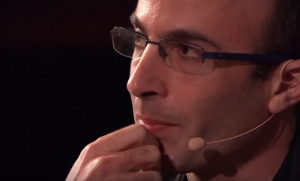Lessons for the 21st Century from Yuval Noah Harari

21 Lessons for the 21st Century is one of the most recent books by Professor Yuval Noah Harari, the Israeli historian and writer who became famous for works such as Sapiens: A Brief History of Humankind and Homo Deus: A Brief History of Tomorrow. His most recent work was translated into more than 40 languages and is a novel approach to today’s reality.
In 21 Lessons for the 21st Century, Harari thought-provokingly analyzes the contemporary world. He basically states that there’s very harmful censorship in our world. In contrast to days gone by, information is no longer forbidden. However, we have flooded our own society with information, and this can hide the issues of real importance.
Harari also tackles issues of burning importance such as power, the role of great empires, immigration, and nationalism, among others. The book 21 Lessons for the 21st Century is divided into five parts, each of which includes a set of lessons. Below, we’ll delve deeper into them.

The technological challenge, one of the lessons for the 21st century
The first part of 21 Lessons for the 21st Century is dedicated to the technological challenge. In this part of the book, Harari includes four lessons, related to the current crisis of liberal values and the problems involved in new technologies.
The lessons are the following:
- Disappointment. The liberal movement has prevailed over fascism and communism Freedom and the struggle for it has gradually lost its value. Now, there’s more skepticism and uncomplicated stories are more common.
- Work. Artificial intelligence is displacing human beings and, in the future, many professions and trades will disappear. A “useless class” will emerge. In other words, people who don’t know how to be productive in this new context.
- Freedom. Macrodata are constantly watching us and we’ve unwittingly handed over to them the power to make decisions for us. The doors to a digital dictatorship are slowly opening.
- Equality. Those who have the data also hold the keys to the future. The power is in the hands of the big technological corporations, which, in the future, could manage the world at their will.
The political challenge
The second block of topics in the 21 Lessons for the 21st Century concerns political challenge. It’s divided into the following sections:
- Community. Although human beings have real bodies, virtual communities are becoming more and more widespread.
- Civilization. Today, most of the world is one civilization. The differences are becoming more and more diluted.
- Nationalism. Most of today’s problems are global, not national.
- Religion. Religions continue to play an important role, sharing what many consider to be fiction.
- Immigration. Immigration is successful as long as the immigrant leaves their culture of origin. There’s a shift from racism to “culturism”.
Despair and hope
In this section, Harari points out that humanity can stay afloat as long as it manages to remain calm and avoid irrational fears. In order to achieve this, he believes that it’s necessary to consolidate secular values through their rational power.
The lessons here are:
- Terrorism. Terrorism is portrayed out of proportion. We shouldn’t have irrational fears.
- War. Warmongering is gaining ground and human stupidity should never be underestimated.
- Humility. Every person and every culture must understand that it isn’t the center of the world.
- God. Being a believer isn’t synonymous with being ethical.
- Secularism. Those who accept their ignorance are more trustworthy than those who proclaim themselves to be the bearers of truth.
The truth
In this section, Harari talks about the importance of fighting prejudice and finding reliable sources to form our criteria. This block includes four lessons:
- Ignorance. You know less than the flood of information leads you to believe.
- Justice. Justice doesn’t comprise abstract values but a reasonable assessment of the causes and effects of decisions and behavior.
- Post-truth. Truth and power only travel together for a while. Sooner or later, power will start to create fiction.
- Science fiction. The book Brave New World is the most prophetic book ever written.

Resilience
The last section of the 21 Lessons for the 21st Century talks about the importance of recognizing that traditional stories no longer explain the world we live in. In addition to that, new stories with enough capacity to explain it haven’t emerged either.
On this subject, there are three lessons to consider:
- Education. The goal of education is no longer to acquire information but to develop the capacity to make sense of it.
- Meaning. Life isn’t a story and it’s important to learn to distinguish fiction from reality.
- Meditation. The possibility of choice still exists, but will probably be lost. Thus, we should observe.
The lessons for the 21st century, as we can see, offer great reflections. They’re turning points for today’s world and they’re worth stopping to think about.
21 Lessons for the 21st Century is one of the most recent books by Professor Yuval Noah Harari, the Israeli historian and writer who became famous for works such as Sapiens: A Brief History of Humankind and Homo Deus: A Brief History of Tomorrow. His most recent work was translated into more than 40 languages and is a novel approach to today’s reality.
In 21 Lessons for the 21st Century, Harari thought-provokingly analyzes the contemporary world. He basically states that there’s very harmful censorship in our world. In contrast to days gone by, information is no longer forbidden. However, we have flooded our own society with information, and this can hide the issues of real importance.
Harari also tackles issues of burning importance such as power, the role of great empires, immigration, and nationalism, among others. The book 21 Lessons for the 21st Century is divided into five parts, each of which includes a set of lessons. Below, we’ll delve deeper into them.

The technological challenge, one of the lessons for the 21st century
The first part of 21 Lessons for the 21st Century is dedicated to the technological challenge. In this part of the book, Harari includes four lessons, related to the current crisis of liberal values and the problems involved in new technologies.
The lessons are the following:
- Disappointment. The liberal movement has prevailed over fascism and communism Freedom and the struggle for it has gradually lost its value. Now, there’s more skepticism and uncomplicated stories are more common.
- Work. Artificial intelligence is displacing human beings and, in the future, many professions and trades will disappear. A “useless class” will emerge. In other words, people who don’t know how to be productive in this new context.
- Freedom. Macrodata are constantly watching us and we’ve unwittingly handed over to them the power to make decisions for us. The doors to a digital dictatorship are slowly opening.
- Equality. Those who have the data also hold the keys to the future. The power is in the hands of the big technological corporations, which, in the future, could manage the world at their will.
The political challenge
The second block of topics in the 21 Lessons for the 21st Century concerns political challenge. It’s divided into the following sections:
- Community. Although human beings have real bodies, virtual communities are becoming more and more widespread.
- Civilization. Today, most of the world is one civilization. The differences are becoming more and more diluted.
- Nationalism. Most of today’s problems are global, not national.
- Religion. Religions continue to play an important role, sharing what many consider to be fiction.
- Immigration. Immigration is successful as long as the immigrant leaves their culture of origin. There’s a shift from racism to “culturism”.
Despair and hope
In this section, Harari points out that humanity can stay afloat as long as it manages to remain calm and avoid irrational fears. In order to achieve this, he believes that it’s necessary to consolidate secular values through their rational power.
The lessons here are:
- Terrorism. Terrorism is portrayed out of proportion. We shouldn’t have irrational fears.
- War. Warmongering is gaining ground and human stupidity should never be underestimated.
- Humility. Every person and every culture must understand that it isn’t the center of the world.
- God. Being a believer isn’t synonymous with being ethical.
- Secularism. Those who accept their ignorance are more trustworthy than those who proclaim themselves to be the bearers of truth.
The truth
In this section, Harari talks about the importance of fighting prejudice and finding reliable sources to form our criteria. This block includes four lessons:
- Ignorance. You know less than the flood of information leads you to believe.
- Justice. Justice doesn’t comprise abstract values but a reasonable assessment of the causes and effects of decisions and behavior.
- Post-truth. Truth and power only travel together for a while. Sooner or later, power will start to create fiction.
- Science fiction. The book Brave New World is the most prophetic book ever written.

Resilience
The last section of the 21 Lessons for the 21st Century talks about the importance of recognizing that traditional stories no longer explain the world we live in. In addition to that, new stories with enough capacity to explain it haven’t emerged either.
On this subject, there are three lessons to consider:
- Education. The goal of education is no longer to acquire information but to develop the capacity to make sense of it.
- Meaning. Life isn’t a story and it’s important to learn to distinguish fiction from reality.
- Meditation. The possibility of choice still exists, but will probably be lost. Thus, we should observe.
The lessons for the 21st century, as we can see, offer great reflections. They’re turning points for today’s world and they’re worth stopping to think about.
All cited sources were thoroughly reviewed by our team to ensure their quality, reliability, currency, and validity. The bibliography of this article was considered reliable and of academic or scientific accuracy.
Harari, Y. N. (2018). 21 lecciones para el siglo XXI. Debate.
This text is provided for informational purposes only and does not replace consultation with a professional. If in doubt, consult your specialist.







